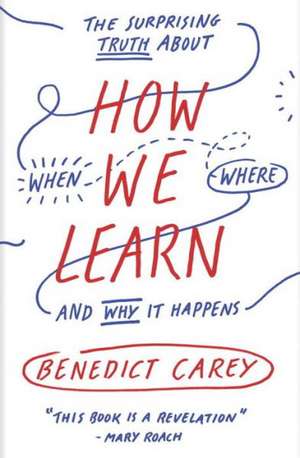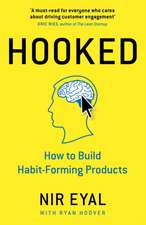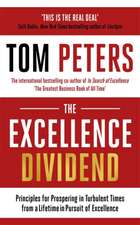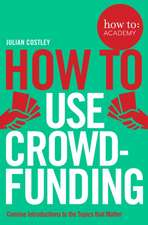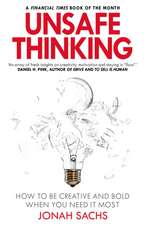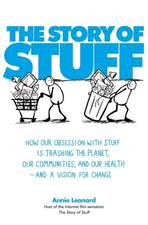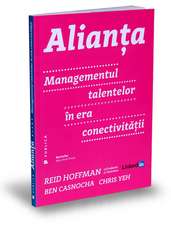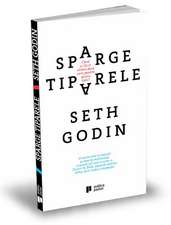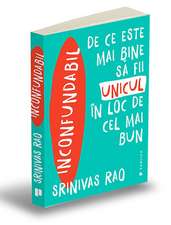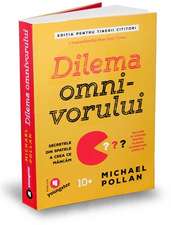How We Learn: The Surprising Truth about When, Where, and Why It Happens
Autor Benedict Careyen Limba Engleză Paperback – 8 iun 2015
From an early age, it is drilled into our heads: Restlessness, distraction, and ignorance are the enemies of success. We re told that learning is all self-discipline, that we must confine ourselves to designated study areas, turn off the music, and maintain a strict ritual if we want to ace that test, memorize that presentation, or nail that piano recital.
But what if almost everything we were told about learning is wrong?And what if there was a way to achieve more with less effort?
In "How We Learn, " award-winning science reporter Benedict Carey sifts through decades of education research and landmark studies to uncover the truth about how our brains absorb and retain information. What he discovers is that, from the moment we are born, we are all learning quickly, efficiently, and automatically; but in our zeal to systematize the process we have ignored valuable, naturally enjoyable learning tools like forgetting, sleeping, and daydreaming. Is a dedicated desk in a quiet room really the best way to study? Can altering your routine improve your recall? Are there times when distraction is good? Is repetition necessary? Carey s search for answers to these questions yields a wealth of strategies that make learning more a part of our everyday lives and less of a chore.
By road testing many of the counterintuitive techniques described in this book, Carey shows how we can flex the neural muscles that make deep learning possible. Along the way he reveals why teachers should give final exams on the first day of class, why it s wise to interleave subjects and concepts when learning any new skill, and when it s smarter to stay up late prepping for that presentation than to rise early for one last cram session. And if this requires some suspension of disbelief, that s because the research defies what we ve been told, throughout our lives, about how best to learn.
The brain is not like a muscle, at least not in any straightforward sense. It is something else altogether, sensitive to mood, to timing, to circadian rhythms, as well as to location and environment. It doesn t take orders well, to put it mildly. If the brain is a learning machine, then it is an eccentric one. In" How We Learn, "Benedict Careyshows us how to exploit its quirks to our advantage.
Praise for "How We Learn"
This book is a revelation. I feel as if I ve owned a brain for fifty-four years and only now discovered the operating manual. Mary Roach, bestselling author of "Stiff "and" Gulp
"
A welcome rejoinder to the faddish notion that learning is all about the hours put in. " The New York Times Book Review"
A valuable, entertaining tool for educators, students and parents. " Shelf Awareness"
"How We Learn" is more than a new approach to learning; it is a guide to making the most out of life. Who wouldn t be interested in that? " Scientific American"
I know of no other source that pulls together so much of what we know about the science of memory and couples it with practical, practicable advice. Daniel T. Willingham, professor of psychology at the University of Virginia
"From the Hardcover edition.""
| Toate formatele și edițiile | Preț | Express |
|---|---|---|
| Paperback (2) | 43.03 lei 3-5 săpt. | +28.32 lei 5-11 zile |
| Pan Macmillan – 4 iun 2015 | 43.03 lei 3-5 săpt. | +28.32 lei 5-11 zile |
| Random House Trade – 8 iun 2015 | 100.39 lei 3-5 săpt. | +16.95 lei 5-11 zile |
Preț: 100.39 lei
Nou
19.22€ • 20.88$ • 16.15£
Carte disponibilă
Livrare economică 31 martie-14 aprilie
Livrare express 15-21 martie pentru 26.94 lei
Specificații
ISBN-10: 0812984293
Pagini: 272
Dimensiuni: 137 x 206 x 15 mm
Greutate: 0.23 kg
Editura: Random House Trade
Notă biografică
Descriere
In the tradition of The Power of Habit and Thinking, Fast and Slow comes a practical, playful, and endlessly fascinating guide to what we really know about learning and memory today—and how we can apply it to our own lives. From an early age, it is drilled into our heads: Restlessness, distraction, and ignorance are the enemies of success. We’re told that learning is all self-discipline, that we must confine ourselves to designated study areas, turn off the music, and maintain a strict ritual if we want to ace that test, memorize that presentation, or nail that piano recital. But what if almost everything we were told about learning is wrong? And what if there was a way to achieve more with less effort? In How We Learn, award-winning science reporter Benedict Carey sifts through decades of education research and landmark studies to uncover the truth about how our brains absorb and retain information. What he discovers is that, from the moment we are born, we are all learning quickly, efficiently, and automatically; but in our zeal to systematize the process we have ignored valuable, naturally enjoyable learning tools like forgetting, sleeping, and daydreaming. Is a dedicated desk in a quiet room really the best way to study? Can altering your routine improve your recall? Are there times when distraction is good? Is repetition necessary? Carey’s search for answers to these questions yields a wealth of strategies that make learning more a part of our everyday lives—and less of a chore. By road testing many of the counterintuitive techniques described in this book, Carey shows how we can flex the neural muscles that make deep learning possible. Along the way he reveals why teachers should give final exams on the first day of class, why it’s wise to interleave subjects and concepts when learning any new skill, and when it’s smarter to stay up late prepping for that presentation than to rise early for one last cram session. And if this requires some suspension of disbelief, that’s because the research defies what we’ve been told, throughout our lives, about how best to learn. The brain is not like a muscle, at least not in any straightforward sense. It is something else altogether, sensitive to mood, to timing, to circadian rhythms, as well as to location and environment. It doesn’t take orders well, to put it mildly. If the brain is a learning machine, then it is an eccentric one. In How We Learn, Benedict Carey shows us how to exploit its quirks to our advantage.
